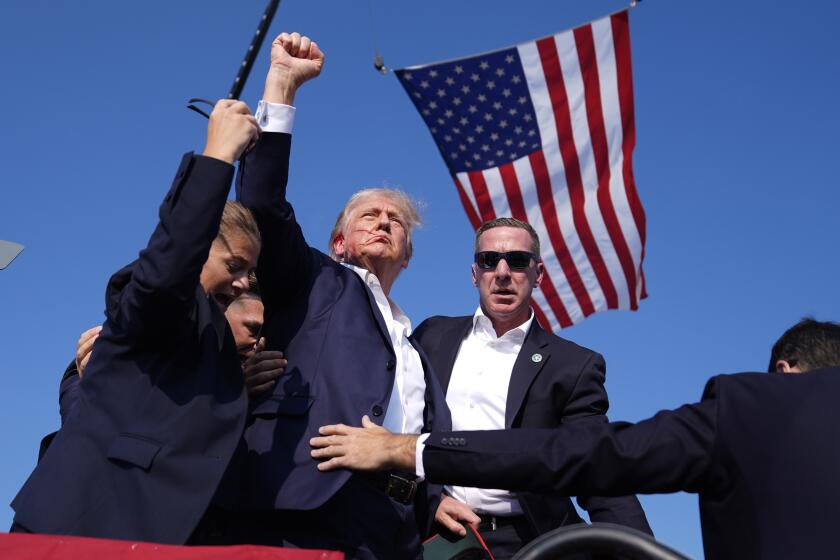Healthcare overhaul may depend on Massachusetts Senate race
President Obama on Friday threw himself into the Massachusetts Senate race where a surging Republican candidacy imperils his signature healthcare plan.
A Republican win Tuesday in the race to replace the late Sen. Edward M. Kennedy (D-Mass.) would strip Democrats of their 60-vote supermajority in the Senate and allow the GOP to block legislation with filibusters. Healthcare legislation has passed both chambers on party-line votes, but a reconciled final version must still be written and approved by both houses.
After negotiating with Democratic congressional leaders on the bill until nearly 1 a.m. Friday, Obama decided to travel to Massachusetts on Sunday to campaign for the Democratic candidate, state Atty. Gen. Martha Coakley, whose once-wide lead over Republican state Sen. Scott Brown has evaporated in recent polls.
Obama also recorded an automated robocall to urge Massachusetts voters to support the Democrat, and he cut a Web video with the same message.
The president’s actions were a clear sign of the alarm spreading among Democrats over their prospects in the race despite a 3-to-1 advantage in registered voters. “If Scott Brown wins, it’ll kill the health bill,” Rep. Barney Frank (D-Mass.) bluntly told reporters before heading to his home state to campaign for Coakley.
Money from labor unions and business interests flooded into Massachusetts, and activists on both sides heard appeals to volunteer for the campaigns. “Every able-bodied Democrat who can be out there in wintertime is up there campaigning,” said Rep. Louise M. Slaughter (D-N.Y.).
Speculation swirled in Democratic circles about what would happen to the health legislation if Brown won. Brown has vowed to vote against the bill if he gets a chance. Congress could rush to pass the bill before the results were certified and he was sworn in, a process that could take two weeks. Or after Brown was seated, the bill could reach Obama’s desk if the House agreed to pass, unchanged, the version of the bill already approved by the Senate.
House Speaker Nancy Pelosi (D-Calif.) on Friday dismissed reports that leaders were speeding the health negotiations in case the Democrats lose the Massachusetts seat. But the irony that they might lose the healthcare fight because of the seat formerly held by Kennedy, a key champion of healthcare reform, was not lost on Democrats.
On Friday, former President Clinton addressed a meeting of House Democrats and tried to buck up the lawmakers. Clinton, who saw his own healthcare campaign collapse in 1994 just before Democrats lost control of Congress, exhorted the lawmakers to help get out the vote Tuesday.
The sense of political peril grew when a Suffolk University poll released late Thursday found Brown ahead of Coakley, 50% to 46%, with independent Joe Kennedy (no relation) at 3%. The poll’s margin of error was plus or minus 4 percentage points.
The poll showed Brown, who has never run for statewide office, seemly capitalizing on doubts about the cost of the healthcare plan and disquiet over the economy, with 90% of respondents saying the recession was not over in the state. The poll showed Coakley failing to ignite voter enthusiasm, and she was judged the loser in a recent debate with Brown.
The special election in Massachusetts is the opening act of a yearlong political drama leading to the 2010 midterm elections.
Republicans are casting the midterm vote as a referendum on Obama’s agenda, especially on the healthcare legislation. Democrats, by contrast, are trying to cast the elections as a choice between the two parties and two agendas, with Republicans as the guardians of an unpopular status quo.
Those dueling strategies were on display in Washington and Massachusetts this week as Obama proposed a new tax on big financial institutions, designed to recoup the taxpayer bailout money.
Coakley immediately backed the idea and challenged Brown to do the same, asking whether he stood with the banks or the taxpayers.
Brown opposed the bank tax as a misguided economic policy in the middle of a recession. “Raising taxes will kill jobs,” his campaign said in a statement.
Vice President Joe Biden, in a mass e-mail on Friday criticizing Brown, illustrated how Democrats would try to turn the coming elections into a choice between the parties rather than focus solely on Obama.
“Given a perfect opportunity to show where his loyalties lie -- with working families in Massachusetts or with the bankers on Wall Street who helped lead us into the mess we’re in -- guess who he chose?” Biden wrote of Brown.
Brian Walsh, spokesman for the National Republican Senatorial Committee, said that Coakley’s problems with voters were “a direct result of her decision to embrace the Democrats’ massive healthcare bill and tax-and-spend agenda.”
The health bill continued to command Obama’s attention Friday, as congressional Democratic leaders came to the White House for the fourth straight day to hammer out a compromise. A big obstacle had been surmounted Thursday, when labor union leaders and the White House reached an agreement on taxing high-cost health plans. Unions had initially opposed the tax.
Senior Democrats met again Friday and said they were getting close to resolving remaining differences between the House and Senate versions of legislation.
Breaking off negotiations in the afternoon, they left congressional and White House staff to assemble proposals to send to the nonpartisan Congressional Budget Office, which must assess how much they would cost. Those estimates are not expected until next week.
Times staff writers Noam N. Levey, Tom Hamburger and Peter Nicholas in Washington contributed to this report.
More to Read
Get the L.A. Times Politics newsletter
Deeply reported insights into legislation, politics and policy from Sacramento, Washington and beyond. In your inbox three times per week.
You may occasionally receive promotional content from the Los Angeles Times.











